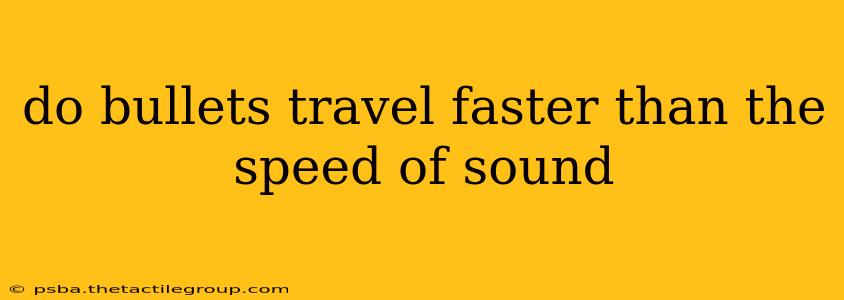Do Bullets Travel Faster Than the Speed of Sound? A Deep Dive into Ballistics and Supersonic Flight
The question of whether bullets travel faster than the speed of sound is a common one, and the answer is: it depends. While many bullets do exceed the speed of sound, making them supersonic, others fall short, remaining subsonic. Let's delve into the factors that determine a bullet's velocity and explore the fascinating world of ballistics.
Understanding the Speed of Sound
First, it's crucial to understand that the speed of sound isn't a fixed constant. It varies depending on the medium through which it travels. In dry air at 20°C (68°F), the speed of sound is approximately 767 mph (1235 km/h or 343 m/s). However, this speed changes with altitude, temperature, and humidity. Higher temperatures and lower air density lead to a faster speed of sound.
Factors Affecting Bullet Velocity
Several factors influence how fast a bullet travels:
-
Caliber: The diameter of the bullet plays a role. Larger caliber bullets, generally, have more mass and therefore may not accelerate as quickly as smaller ones.
-
Powder Charge: The amount of propellant (gunpowder) used significantly affects velocity. A larger charge generates more pressure, propelling the bullet faster. This is a primary factor in achieving supersonic speeds.
-
Barrel Length: A longer barrel allows for more complete burning of the propellant, leading to higher velocities. The bullet spends more time accelerating within the barrel.
-
Bullet Design: The shape and weight of the bullet are crucial. Aerodynamic designs minimize air resistance, allowing for higher velocities. A heavier bullet, while potentially less affected by wind, may also be slower due to higher inertia.
-
Environmental Conditions: As mentioned earlier, temperature, humidity, and air pressure affect both the speed of sound and the bullet's velocity.
Supersonic vs. Subsonic Bullets
Bullets are categorized as either supersonic or subsonic based on their velocity relative to the speed of sound:
-
Supersonic Bullets: These bullets exceed the speed of sound, typically resulting in a loud "crack" or "bang" as they travel, often followed by a second, quieter sound from the projectile's shock wave. High-powered rifles and some handguns commonly use supersonic ammunition.
-
Subsonic Bullets: These bullets travel slower than the speed of sound. This is often desirable in situations where noise reduction is critical, such as hunting or tactical applications. Subsonic rounds generally produce less recoil and have a flatter trajectory at close ranges.
The Significance of Supersonic and Subsonic Ammunition
The difference between supersonic and subsonic ammunition is significant for various applications. For long-range shooting, the superior ballistic characteristics of supersonic ammunition compensate for wind and gravity, resulting in higher accuracy. On the other hand, subsonic ammunition's reduced noise signature makes it ideal in situations demanding stealth.
Conclusion
In summary, while many bullets travel faster than the speed of sound, it's not universally true. The speed is determined by a complex interplay of factors, including the cartridge design, firearm characteristics, and environmental conditions. Understanding these factors is essential for anyone interested in ballistics, firearms, or hunting.

